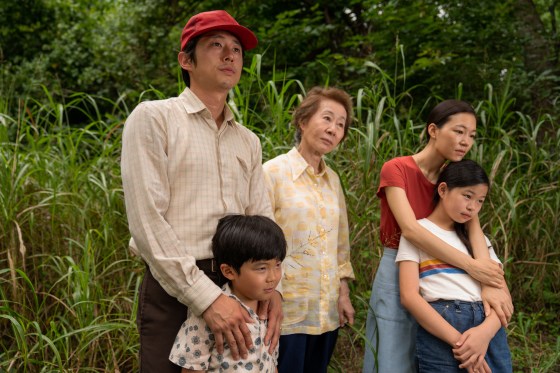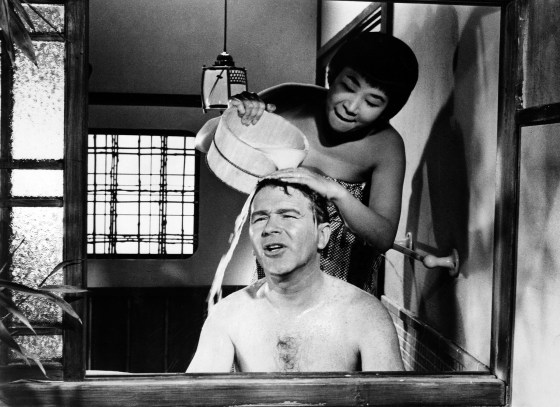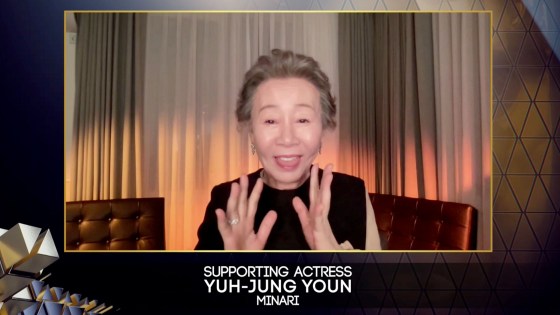New story in Entertainment from Time: Yuh-Jung Youn Is an Oscar Frontrunner. There’s an Important History Behind Her Awards Season Success
For the first time in the Oscars’ 93-year history, a Korean actress is nominated for an Academy Award. Yuh-jung Youn’s name may be new to some in the U.S., but it’s familiar to many in South Korea, where the 73-year-old actor’s career in both film and television has spanned five decades. While Youn has earned dozens of accolades in her home country, her performance in Lee Isaac Chung’s Minari has propelled the actor to a new level of international recognition—and one that has been conspicuously rare for performers of Asian descent.
In Chung’s semi-autobiographical film, an immigrant Korean American family relocates to Arkansas to pursue father Jacob’s (Steven Yeun) dream to start a family farm. Youn plays his mother-in-law Soon-ja, who joins them from Korea to help take care of her grandchildren. Soon-ja is spunky and feisty: she loves to watch wrestling, play cards and, as her grandson David (Alan Kim) puts it, is “not a real grandma” because she swears and wears men’s underwear. Youn’s performance was praised in reviews following the film’s premiere at the 2020 Sundance Film Festival and subsequent release earlier this year.
The actor’s awards season has brought with it a number of firsts: Youn became the first Asian winner in any individual motion picture category at the SAG awards, and the first Korean actor to win a BAFTA award. At the 2021 Oscars, Youn is a frontrunner for Best Supporting Actress; a win would make her the first Asian performer to receive an acting award since 1985. Though the mood is largely celebratory, that joy is tempered by the acknowledgement of the Academy Awards’ troubling history when it comes to recognizing Asian actors and the stereotypes enforced in the rare instances when actors have been recognized. These historical oversights gained more widespread attention when, across awards shows, Parasite collected heaps of accolades for the film itself but few for its individual performers in acting categories—and none at the 2020 Academy Awards.
And while this year’s Oscar nominations are its most diverse ever—Steven Yeun became the first Asian American to be nominated for Best Actor, and Minari is nominated for Best Picture along with Chloé Zhao’s Nomadland, the first time that two films by Asian or Asian American directors are nominated for the category—only time will tell if the honors lead to lasting change. To understand what Youn’s success means moving forward, it is important first to look backward.

The history of Asian actors at the Oscars
Since its first ceremony in 1929, the Academy Awards has recognized fewer than two dozen Asian performers in acting categories—with years and sometimes decades in between nominations, not to mention wins. While no Asian performer has won an Oscar for Best Actress, no actor of Asian descent has won for Best Actor since Ben Kingsley in 1983 for his performance in Gandhi. And for the Best Supporting Actress and Actor categories, only one Asian actor has earned each accolade: Miyoshi Umeki, who was of Japanese descent, for her role in 1957’s Sayonara, and Haing S. Ngor, who was of Cambodian descent, for his role in 1984’s The Killing Fields
Besides the rarity of Asian actors earning recognition at the Academy Awards, Nancy Wang Yuen, a sociologist and author of Reel Inequality: Hollywood Actors and Racism, says that past honors have particularly highlighted roles that rely heavily on stereotypes of Asian women. “There are very few Hollywood movies that actually write and conceptualize Asian women in roles that have agency—that they’re not objects of desire or throwaway roles that you can’t win awards for,” Yuen explains.
When Umeki won her Oscar, it was for her performance of Katsumi, a Japanese woman whose character arc focuses on a forbidden love with an American Airman, played by Red Buttons, who she met in Japan during the Korean War. Yuen describes one scene in which the male lead, also a U.S. pilot, uses a racial slur in reference to Katsumi. In another, Katsumi bathes Kelly while wrapped in a towel. “That’s very much the way that Asian women have been hypersexualized and exoticized in the Hollywood imagination,” Yuen says. “This is the only Asian actress to ever win an Oscar, and she totally exemplifies the problems of Asian women representation.”

Yuen gives a more recent example: Rinko Kikuchi, a Japanese actor who was nominated for Best Supporting Actress in 2007 for her role in Babel. Kikuchi played Chieko Wataya, who is deaf and mute and does not have any speaking lines, and whose role was also sexualized. In one scene, she approaches a detective nude and attempts to seduce him. Yuen says it’s another case of an Asian woman playing a role that is “othering.” “Asian women have not had fully complex roles and I think Youn Yuh-jung, her role is actually fully human,” she explains.
Yuen calls attention to another similarity between the roles played by not just Umeki and Ngor but also Sessue Hayakawa, who was nominated in 1958 for playing Colonel Saito in The Bridge on the River Kwai: war. “Just in that subject matter, the Asians are so othered,” she explains. Youn’s role in Minari is different: she may be closely tied to the traditions and culture of the country from which she’s just traveled, but her arc is presented in the context of a distinctly Asian American story.
Is the Academy changing—and will it prompt broader change in Hollywood?
Though Youn has already broken new ground in Oscar history, many are skeptical as to whether this recognition signals real change in Hollywood. Brian Hu points to the reality that even when historic wins have happened, they’re seldom, if ever, repeated. Hu, an Assistant Professor of Television, Film and New Media at San Diego State University and Artistic Director at the San Diego Asian Film Festival, gives the example of Ngor’s 1985 win for The Killing Fields. Since Ngor, no Southeast Asian actor has been nominated at the Academy Awards. Hu also notes that Umeki’s win in 1958 did not lead to significantly more roles for Asian Americans. “Hollywood can claim that they promoted diversity with that award,” he says. “It’s a part of its resume, but it’s not actually indicative of very much change.”
This point extends beyond the Asian American community to other underrepresented groups, like Marlee Matlin becoming the first—and, to this day, only—deaf performer to win an Oscar, for Children of a Lesser God in 1987. “We can talk about historic all we want,” Hu says of Youn’s awards season, “but, to me, ‘historic’ is only going to ever be a bit of trivia, unless it actually changes things culturally.”
When it comes to increasing the recognition of Asian actors at the Oscars, Michelle K. Sugihara says there is both an external and internal component. “It’s a little bit of the chicken-egg thing because it’s the general population but also the Academy voters,” says Sugihara, Executive Director of CAPE (Coalition of Asian Pacifics in Entertainment)—a nonprofit dedicated to advancing AAPI representation in Hollywood. Internally, Sugihara says it’s essential to ask the questions of, what does the membership of the Academy look like and who are these voters? After #OscarsSoWhite took off in 2015 and 2016 when the Academy announced two consecutive years of 20 all-white acting nominees, the organization has since invited new members each year with the goal of increasing diversity. Whereas its 6,261 members were around 92% white and 75% male at the start of 2016, the Academy’s membership is now at more than 9,300, and as of 2019 the group was 84% white and 68% male.
But she notes that the general public can play a role in boosting the visibility of Asian actors. Sugihara brings up Gold Open, a movement focused on promoting the opening weekend success of multicultural films, on which CAPE has partnered with the nonprofit Gold House. Gold Open has organized screenings of films including Minari, The Farewell and Crazy Rich Asians, based on the idea that bigger box office numbers lead to more Asian-led projects getting greenlit. “We really try to educate the community about the importance of the box office numbers for opening weekend,” Sugihara says. “The Gold Open model is voting with your dollars and being more intentional and discerning about what content you allocate your time and money toward.”
The need for structural change

While Yuh-jung Youn will make history if she wins Best Supporting Actress on Sunday, a number of structural changes need to happen for her success—and that of Minari’s—to be a turning point for Asian and Asian American performers in Hollywood. For one, Nancy Yuen hopes that Hollywood will continue to recognize Asian American stories as American stories. And when they do, to cast Asian American actors as leads—which remains rare. “It still takes these kinds of independent movies that are coming out of the passion and perseverance of Asian American directors—and in the case of Minari, producer [Christina Oh] as well—to make these projects happen.”
She says that while Hollywood has rarely recognized actors of Asian descent—citing Parasite and Crouching Tiger, Hidden Dragon as examples—there is an additional hurdle for Asian American actors. “[Youn] has had more opportunities to exercise her craft than, unfortunately, a lot of Asian American actors because people here are not getting those meaty roles because of racial barriers,” Yuen explains.
Brian Hu feels similarly. While he acknowledges that the Oscars has seldom acknowledged both Asian and Asian American actors, he says that Youn and other Asian actors like Song Kang-ho (Parasite, The Host) have had careers’ worth of being able to explore a variety of roles. Because of the relative lack of opportunity in the U.S., Hu says, “For an Asian American actor [like Steven Yeun] to get a nomination, to me, [is] even more extraordinary.”
Hu also hopes film festival programmers take note of the way in which Minari’s prizes and buzz generated out of Sundance launched its momentum. “Maybe this is going to be a turning point for other film festivals all around the country to say, we should be more hungry for Asian American voices, and maybe that’s going to lead to a certain groundswell that will lead to larger change,” Hu says.
‘Decentering Western awards’
After Yuh-jung Youn was awarded Best Supporting Actress at the BAFTA Awards earlier this month, she gave a speech that has since gone viral. “Every award is meaningful but this one especially, [being] recognized by British people, known as very snobbish people and they approve me as a good actor. So I’m very, very privileged and happy,” Youn said. While she has since apologized for the comments, some have viewed Youn’s acceptance speeches as a way of placing Western awards in a broader global context. “She’s labeling the West through her lens,” Yuen said of the BAFTA speech. “She’s decentering Western awards by both winning them, and by reframing them through her experience as a South Korean actress.”

In her mind, Youn’s words are similar to Bong Joon-ho’s comments during Parasite’s awards season—from calling the Oscars “very local” to his subtle shade at the 2020 Golden Globes that “once you overcome the one-inch tall barrier of subtitles, you will be introduced to so many more amazing films.” “They’re happy to be there, but they want to tell you what they think about all the hoopla,” Yuen said, emphasizing that there’s so much talent in the global Asian majority. “Even if they don’t get acknowledged by Hollywood, they’re still doing that amazing work and it’s up to Hollywood to catch up to the rest of the world,” she says.





Post a Comment